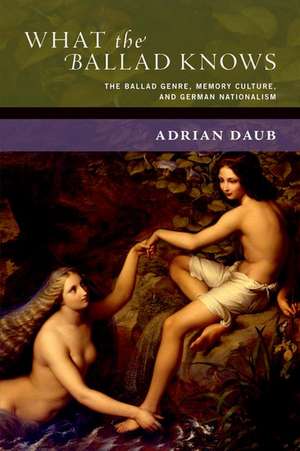What the Ballad Knows: The Ballad Genre, Memory Culture, and German Nationalism: New Cultural History of Music
Autor Adrian Dauben Limba Engleză Hardback – 14 noi 2022
Preț: 438.84 lei
Preț vechi: 486.10 lei
-10% Nou
Puncte Express: 658
Preț estimativ în valută:
83.97€ • 87.90$ • 69.89£
83.97€ • 87.90$ • 69.89£
Carte disponibilă
Livrare economică 26 februarie-04 martie
Preluare comenzi: 021 569.72.76
Specificații
ISBN-13: 9780190885496
ISBN-10: 0190885491
Pagini: 296
Ilustrații: 15 halftones
Dimensiuni: 237 x 163 x 24 mm
Greutate: 0.58 kg
Editura: Oxford University Press
Colecția OUP USA
Seria New Cultural History of Music
Locul publicării:New York, United States
ISBN-10: 0190885491
Pagini: 296
Ilustrații: 15 halftones
Dimensiuni: 237 x 163 x 24 mm
Greutate: 0.58 kg
Editura: Oxford University Press
Colecția OUP USA
Seria New Cultural History of Music
Locul publicării:New York, United States
Recenzii
Adrian Daub's brilliant synthesis of the many lives of ballads in German culture breathes new and more complex meaning into Eric Hobsbawm's and Terence Ranger's concept of invented traditions. Daub calls the ballad "poetry one lived with," and his subtle, lucid analysis of its many contexts—travel, family, the schoolroom, the public sphere, the national imaginary—sketches a great arc of continuity in German life. It is erudite, graceful, and wise—a major achievement.
Readers with interests in lyric generally, in poetry and nationalism, and in poetry and music will learn a great deal from this beautifully written, wide ranging, and illuminating volume.
This volume will be valuable for scholars of German literature and music history.
What the Ballad Knows enacts an exemplary mission of recovery for a repertory that has enjoyed less eminence than its cousin, the lied. It will surely engender many followers, and possibly many epigones too.
Readers with interests in lyric generally, in poetry and nationalism, and in poetry and music will learn a great deal from this beautifully written, wide ranging, and illuminating volume.
This volume will be valuable for scholars of German literature and music history.
What the Ballad Knows enacts an exemplary mission of recovery for a repertory that has enjoyed less eminence than its cousin, the lied. It will surely engender many followers, and possibly many epigones too.
Notă biografică
Adrian Daub is Professor of German Literature and Comparative Literature at Stanford University and author of Uncivil Unions: The Metaphysics of Marriage in German Idealism and Romanticism (2012), Four-Handed Monsters: Four-Hand Piano Playing and Nineteenth-Century Culture (OUP, 2014), and The Dynastic Imagination: Family and Modernity in Nineteenth Century Germany (2020). He is co-author with Charles Kronengold of The James Bond Songs: Pop Anthems of Late Capitalism (OUP, 2015).









